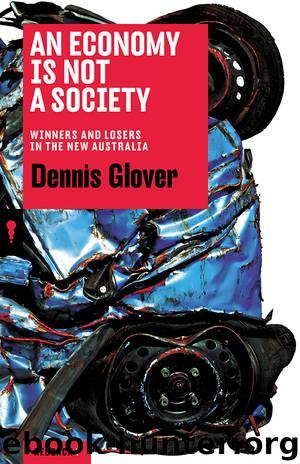An Economy is Not a Society by Glover Dennis;

Author:Glover, Dennis;
Language: eng
Format: epub
Publisher: Schwartz Publishing Pty. Ltd
On the death of Robin Williams, a friend of mine, Emily, sent me a link to a YouTube clip of the best scene from Dead Poets Society. I am what you would call very pro-Williams – many people aren’t – and mainly because of this movie, which I saw with a girlfriend I was very fond of when it was released in 1989. At twenty-five and about to head off to Cambridge, I was still young enough to put myself in the shoes of the movie’s students; arriving there still infected by Peter Weir’s great story, in which the heroes are the romantic poets Whitman, Thoreau, Byron and Tennyson, I was determined not to spend all my time conducting some dry-as-dust academic research but to be the sort of student the Williams character – who was named (for us perhaps ironically) Mr Keating – would have wanted me to be. I would try to read everything – the classics, philosophy, literature, poetry – and breathe deeply the romance of the great university town. My PhD thesis would be a meal ticket and no more. If I didn’t fully succeed in this, I did at least try.
I’m now older than Mr Keating was in the film, and seeing the YouTube clip affected me in a different way. The teacher’s message still seemed subversive, but for different reasons. You may recall the scene. Mr Keating, who has just taken the job of English master at the exclusive male boarding school where he himself was once a student, asks his class to open their poetry textbook, written by one Dr J. Evans Pritchard, at the introduction. He tells one student, Neil, to read the opening paragraph. It says that the greatness of a poem can be determined in a relatively simple way, by gauging first how artfully the objective of the poem has been rendered (through the use of meter, rhyme and figures of speech) and then how important that objective is. And the simplest way to do this is to plot these qualities on a graph, with the poem’s artistic perfection (‘P’) plotted horizontally and its importance (‘I’) plotted vertically: ‘Calculating the total area of the poem yields the measure of its greatness.’ As Neil is reading this, Mr Keating draws such a graph on the blackboard, and next to it the formula ‘P × I = G’. He then turns to the class and says, ‘Excrement!’ before instructing his pupils to take Dr J. Evans Pritchard’s introductory chapter in their hands and ‘Rip it out!’
In 1989 the culture wars were just beginning, and this scene became one of its early battles. It fitted the template perfectly: Keating’s instruction to his class to rip out the text as a metaphor for the corrupting of the young, who were being incited by their irresponsible teachers to reject authority and take up a romantic variant of nihilism. Writing in 1990, the Australian sociologist John Carroll – whose work I admire, even though I suspect
Download
This site does not store any files on its server. We only index and link to content provided by other sites. Please contact the content providers to delete copyright contents if any and email us, we'll remove relevant links or contents immediately.
The Brazilian Economy since the Great Financial Crisis of 20072008 by Philip Arestis Carolina Troncoso Baltar & Daniela Magalhães Prates(116962)
International Integration of the Brazilian Economy by Elias C. Grivoyannis(86782)
The Art of Coaching by Elena Aguilar(52844)
Flexible Working by Dale Gemma;(23232)
How to Stop Living Paycheck to Paycheck by Avery Breyer(19604)
The Acquirer's Multiple: How the Billionaire Contrarians of Deep Value Beat the Market by Tobias Carlisle(12190)
Thinking, Fast and Slow by Kahneman Daniel(11988)
The Radium Girls by Kate Moore(11877)
The Art of Thinking Clearly by Rolf Dobelli(10150)
Hit Refresh by Satya Nadella(9001)
The Compound Effect by Darren Hardy(8742)
Tools of Titans by Timothy Ferriss(8163)
Atomic Habits: Tiny Changes, Remarkable Results by James Clear(8130)
Turbulence by E. J. Noyes(7903)
Change Your Questions, Change Your Life by Marilee Adams(7575)
A Court of Wings and Ruin by Sarah J. Maas(7569)
Nudge - Improving Decisions about Health, Wealth, and Happiness by Thaler Sunstein(7472)
How to Be a Bawse: A Guide to Conquering Life by Lilly Singh(7349)
Win Bigly by Scott Adams(7041)
